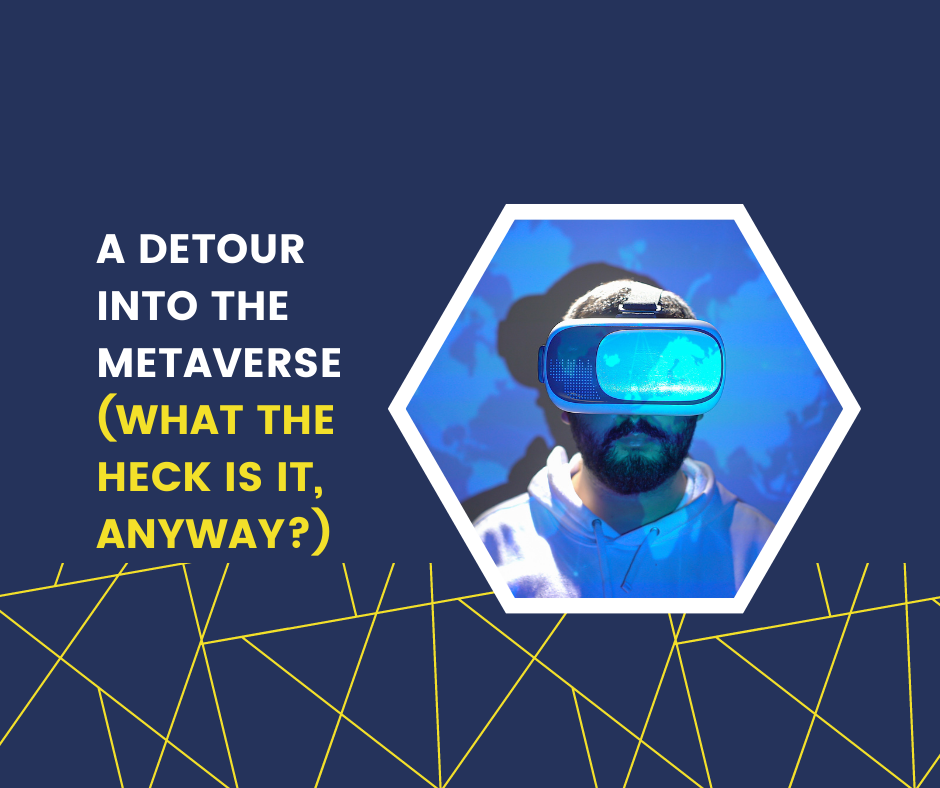Technology Is Changing — Let’s Take a Detour Into the Metaverse (What the Heck Is It, Anyway?)
Technology is an integral part of our lives. Being located in the Bay Area, it’s difficult not to hear or read about the future of technology. Recent terms like cryptocurrency, the Metaverse, and AI (artificial intelligence) are inching their way forward towards the mainstream. As we now understand, it’s not all positive. From the consolidated power over data held by a handful of firms (i.e. Facebook & Google) to Elon Musk’s warnings about AI robots, there are risks faced not only by technology innovators but society as a whole.
While I appreciate what technology has done to improve society, I’m not typically the first to jump on board. I kept my Blackberry and resisted giving up that physical phone keyboard for several years after the iPhone was launched. In hindsight, that seems almost funny.
I do, however, try to understand what’s coming down the road. Both to improve my understanding as well as to help me translate what this might mean for doctors and those who work for them in medical practices. I came across “How to Explain the ‘Metaverse’ to Your Grandparents” and found it to be an excellent background resource that helps separate the current hype from what will likely be a major impact on how we interact with computers.
In 1995, it was difficult to predict how fundamentally the internet was going to change the way we live, from accessing information to purchasing behavior. We take a lot for granted these days, but at the dawn of the World Wide Web, we still used the Yellow Pages and Encyclopedias. I haven’t touched either of those in over 20 years.
As the article’s author Aaron Frank makes clear, “the next great computing interface is emerging — it just doesn’t have a good name yet.” As a result, pundits are throwing around terms like “augmented reality” and “Web3” but aren’t providing just plain folks like me with the context to evaluate what this even means. In contrast, Aaron Frank does a great job of walking us through the history of computing to understand where it’s headed.
I strongly encourage you to read or listen to the article (and feel free to hit me with reactions or comments). From what I gather, here are two areas that could well impact the patient experience in a medical practice:
3D Space
As humans, we were built to interact in three-dimensional space. Computers traditionally have been limited to the two-dimensional screen. That’s already changing. The Nintendo Wii was just the first step in how the way we interface with computing will evolve towards a far more immersive experience that takes advantage of depth in addition to height and width. Practices will increasingly have tools to connect with patients not just remotely (as is now the case with telemedicine) but also where both parties meet in a virtual environment. Think about how that might impact patient education, consultations, and follow-up. These more immersive environments could dramatically improve patient understanding and compliance as well as acceptance of recommendations.
Blockchain
The ability to have a decentralized method to keep track of transactions will impact healthcare. The low-hanging fruit is insurance verification and the ability to more rapidly approve planned patient care among providers, insurers, and hospitals. That will be far less frustrating for patients and doctors. And if the government can adopt this in such a way to reduce Medicare fraud, we all win as taxpayers. I’m rooting for blockchain in healthcare.
The next wave of technology is real and also really confusing. Despite my son’s exuberance last summer for Doge Coin, I’m not smart enough to predict how cryptocurrencies will impact medical practices. That seems a long way off, although I did run across one LASIK surgeon who accepts Bitcoin as a form of payment as well as an interesting development for a small coastal town in El Salvador nicknamed Bitcoin Beach.
For the time being, I’ll just focus my attention on how technology can be used to enhance the patient experience!

